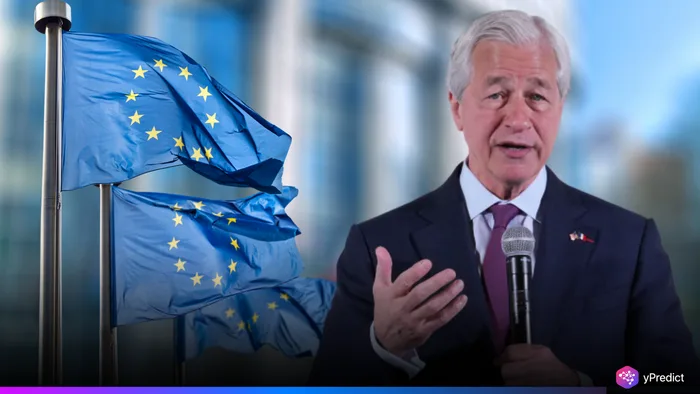
Europe is currently at a crossroads due to sluggish growth, inflexible regulations, and a real lack of innovation. JP Morgan CEO Jamie Dimon has been a vocal critic of Europe’s economic decline, and has vehemently warned Europe that it is losing its place in the race of the global economy. In his speech, Dimon pointed out a fall in Europe’s portion of U.S. GDP, from 90% to 65%, in less than a decade.
This point is much larger than just points on a graph. Dimon put it well in saying that this represents Europe’s competitiveness decline. The U.S. and China are investing in innovation, infrastructure, and growth, and if Europe does not make significant progress, it may lose even more influence over a future global economy.
Why Jamie Dimon Is Calling Out Europe’s Economic Lag
Jamie Dimon has been blunt. He stated that Europe does not have global tech and industrial champions that can compete with those in the U.S. and China. He sees fragmentation, red tape, and slow decision-making in Europe.
Dimon gave statistics showing that Europe has drastically decreased its GDP ratio to the U.S. because of a lack of productivity, investment in tech, and world-class firms. The U.S. has Silicon Valley, China has state-backed growth, and Europe cannot keep up.
Europe’s Slide in Global Rankings
Europe’s economic decline is more than just talk. There has been stagnation in productivity and weak capital investment. Countries like Germany and France still have significant industrial sectors but are experiencing growth rates significantly below those of the U.S.
In fact, the narrative of Europe falling behind grows each day, both in the emerging sectors of AI, biotech, and advanced manufacturing, which remain dominated by U.S. and Asia, and by cemented U.S. benefactors of a large and unified market and focused and supported investments into technology (not to mention Europe is still awaiting lengthy regulatory approvals and global innovation cycles).
What’s Driving the Global Economic Race Ahead
The global economic race is now about speed, innovation, and scale. The U.S. and China continue to invest heavily in infrastructure, AI, defense tech, and semiconductors. These sectors have a powerful economic influence and create jobs, helping maintain global leadership.
Europe’s fragmented approach means different countries pursue separate industrial strategies, reducing scale and coordination. Dimon says this lack of cohesion is a major drag on growth. Without unity and focused investment, Europe risks missing out on next-gen economic drivers.
Urgent Need for Economic Reforms in Europe
To catch up, Dimon believes economic reforms Europe desperately needs include labor market changes, tax incentives for innovation, and regulatory simplification. Without these, Europe may fail to attract global capital and talent.
He also mentioned matching with NATO, modernization of energy systems, and investment in education and R&D. Of course, examples from countries like Ireland and the Netherlands show what agility and reform can accomplish, but that is still the exception.
Conclusion
Europe continues to have top-tier universities, talented employees, and solid industrial experience. But Dimon said, those assets need bold leadership and effective buy-in.
Whether Europe can stem the decline is based on how quickly they band together to respond to the challenge. If they act decisively to make strategic investments and modernize systems, they have time. If not, the gap between Europe and the broader world continues to widen.







